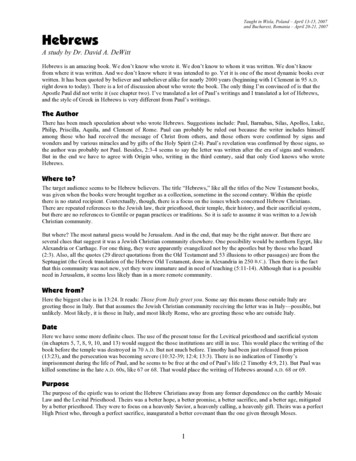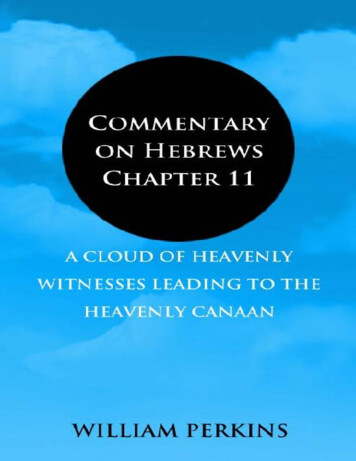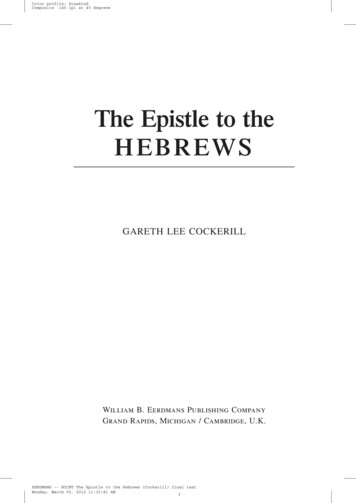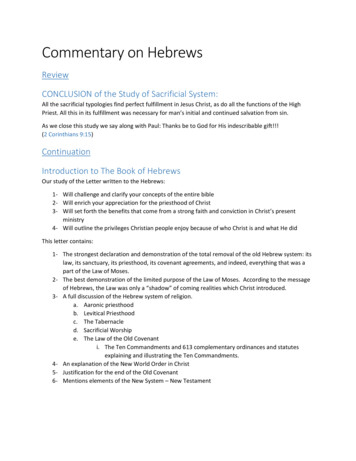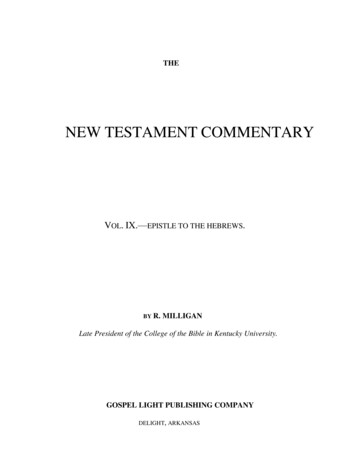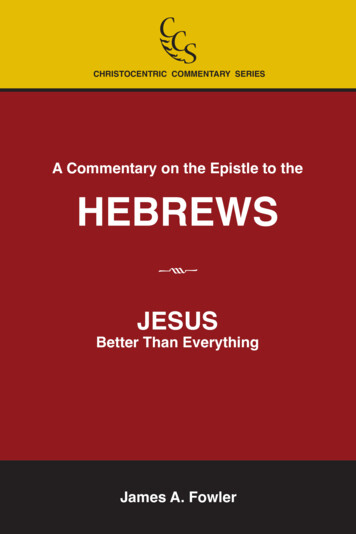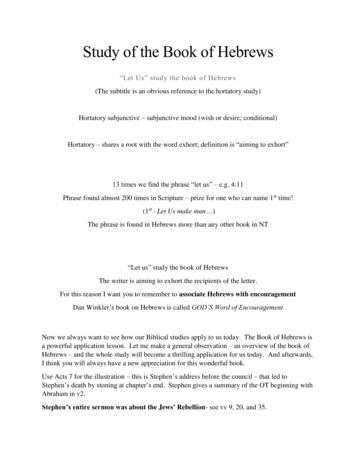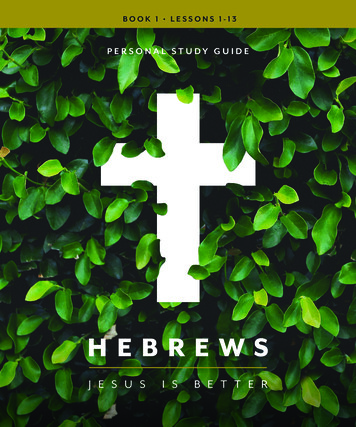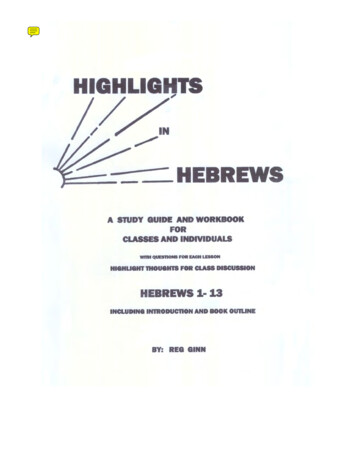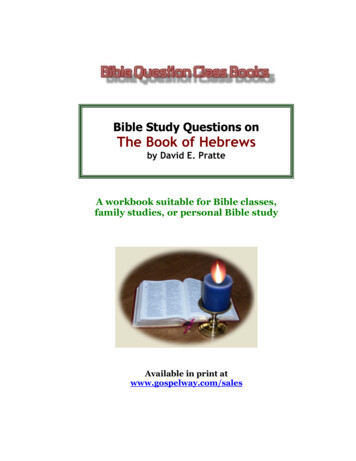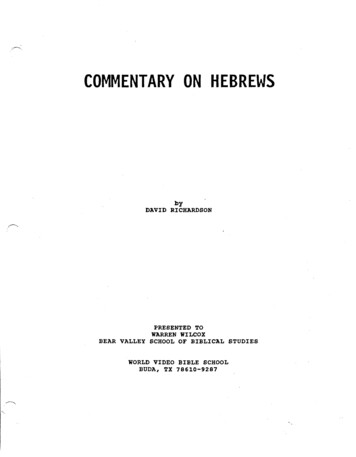
Transcription
COMMENTARY ON HEBREWSbyDAVID RICHARDSONPRESENTED '1'0WARREN WILCOXBEAR VALLEY SCHOOL OF BIBLICAL STUDIESWORLD VIDEO BIBLE SCHOOLBUDA, TX 78610-9287".
HEBREWSINTRODUCTIONJ.II.IMPORTANCE OF THE EPISTLE.A.Shows the proper relationship between the Old and New Testaments.B.Explains more fully certain Old Testament passages and ideas.C.Contains sublime descriptions of dignity and glory of Christ.D.Shows the excellence of His sacrifice.E.Demonstrates the superiority of His gospel.F.Has important -exhorting- passages.G.Is of superior literary quality (finest style in the New Testament).NAME OF THE EPISTLE AND RECIPIENTS.A.tlTo the Hebrews" is found in all our present "SSeB.Definitely to those familiar with Jewish system - All contrasts arewith Jewish background ideas.C.Probably to those in Palestine who were Jewish Christians.1.Many early historians agree.2.Certain passages would so indicate:Jewish practices - 13:13.Deprived of possessions - 10:34.Sacrifices are still being offered - 8:4; 10:11.From Italy - 13:24.(Apparently) - A day of trial ahead - 10:25.Not resisted unto blood - 12:4.III.CHARACTER OF THE READERS.2:3;6:10;13:4,5;2:4;6: 12;13:7;3:1;10:32-34;13:9;13:12;10:36;13:18,19;5: 12;12:4;13:23,246:1;12:16;
IV.PURPOSE - TO PREVENT APOSTASY fROM CHRISTIANITY TO JUDAISM.A.By showing it superior to JUdaism (a God-given religion).B.By showing perfection and finality of Christ's priesthood.V.DATE - ABOUT 63 (DEPENDING ON AUTHOR) BUT BEfORE 70.VI.EARLY EVIDENCE Of ITS BEING COUNTED SCRIPTURE.A.Quoted as Scripture 96 A.D. by Clement of Rome.B.Justin - A.D. 140.C.Found in oldest versions of the New Testament.D.found in oldest listings of the New Testament books.E.All its doctrines are in harmony with other Scripture.2
HEBREWSOUTLINEI.Christ is superior to all other mediators and messengers.II.Christ is superior to the angels1:4-2:18A.Showed Himself betterB.He is to be worshipped by angels1:6C.Angels are servants1:7D .He is called God1:8E.He is anointed1:9F.He is the unchanging creator1:10-12G.He is to be served by angels1:13,14H.His gospel more binding than the Law2:1-4J.As man He overcame and is superior to angels2:5-9J.By being man He can not be the1:4,5prop;tiat on.III. Christ is superior to MosesIV.V.VI.1:1-3A.Christ as Son is greater than Moses as servantB.Beware of unbelief2: 10-183:1-193:1-63:7-19Christ is superior to Joshua4:1-13A.Christ's rest superior to Joshua's4:1-10B.Beware of disobedienceChrist is superior as High Priest4:11-134:14-6:20A.Christ is High Priest 1n heavenB.Christ is appointed by God HimselfC.Beware of immaturityD.God's "hope n for us6:13-20Christ superior to Melchizedek7:1-8:5A.Melchizedek priesthood superior to Levitical priesthood4:14-5:35:4-105:11-6:121: 1-10
B.Christ superior by the power of an endless 1i feC.Christ superior by His superior sacrificeVII. A better covenantX.XI.7:26-8:58:6-9:28A.The new covenant established8:6-12B.What the old covenant was9:1-10C.Christ and the new covenant are superiorVIII. A better sacrificeIX.7:11-25A.The inferiority of the old LawB.The superiority of Christ's sacrificeC.Beware of returning to the old 2:29A.The faith that savesB.By faith11: 1-40C. .Faith purjf\ed by chastening12:1-17D.The new Zion is superior12:18-24E.Beware of losing faith12:25-29Social andlsPiritual dutiesA.socii' dutiesB.Spirltual 25
HEBREWSChapter One1.GOD AFTER HE SPOKE LONG AGO TO THE FATHERS God has always spoken to man (cf. Mt. 10:20; Lk. 1:45,70; In. 9:29; Acts 3:21;7:6). Thus, the Hebrew writer begins by confirming that God did indeed revealthe Jewish system to bthe fathers and prophets."'IN THE PROPHETS According to Arndt and Gingrich, the2 Greek word, EN, shows that the prophets werethe instrument by which God spoke. Thus, a prophet was anyone who spoke forGod. cf. Nu. 12:2; Amos 3:7,8. 3IN MANY PORTIONS POLUMEROS is a combination of POLUS and MEROS meaning "in many parts or par cels."4 Nicoll explains that this adverb ."points to the fragmentary character of former revelations. Theywere given piece-meal, bit by bit, pari' by part, as the peopleneeded and were able to receive them. The revelation of God wasessentially progressive; all was ot disclosed at once, because allcould not at once be understood."AND IN MANY WAYS POLUTROPOS is an adverb meaning "in various or manifold modes. lib This is areference to the various ways that God spoke to man in the Old Testament (i.e.voice, Ex. 24:4; dreams, Dan. 2:1; fingers, Dan. 5:5).7Z.IN THESE LAST DAYS What is meant by "last days?""I.There are three positions:They refer simply to the closing period of the Jewish age (Moll).2.They refer exclusively to the Christian age (Stuart).3.They refer to the closing period of the prophetic era, embracingboth the ministry of Christ and of His apostles (Luther)."sWright and Boatman see it as the third view. 9HAS SPOKEN TO US The verb, ELALESEN, is aorist tense and thus signifies that the speaking has beencompleted once for all time.'o (cf. Jude 3). God's work was not final untilJesus came.'11
,
IN HIS SON "His" is not in the Greek text. The absence of the article is important.'2WHOM HE APPOINTED HEIR OF ALL THINGS "Heir", KlERONOMON, means:1.One who obtains a lot or portion.']2.One who inherits anything by the will of another.'4Being "heir" was dependent upon Jesus being God's son.'5THROUGH WHOM ALSO HE MADE THE WORLD "World," AIONAS, use to mean "ages," but now means "universe."'6 .AND HE IS THE RADIANCE OF HIS GLORY "Radi ancit" APAUGASMA, is alight comi ng from aluminous body; a light that youcan see. I cf. In. 14:9; Col. 1:15; 2:9. Jesus is the visible manifestation.of God.THE XACT REPRESENTATION OF HIS NATURE "Exact representation," CHARAKTER, originally referred to "a s.raving-too1," butlater came to refer to "the impression" made by that tool. 8 "His nature,"HYPOSTASIS, originally meant "a substructure; a foundation," b t later came tobe translated as "nature, substance, person, confidence, etc. 9 In substanceJesus is the same as God.AND UPHOLDS All THINGS BY THE WORD OF HIS POWER Barnes says Jesus does thi s "by Hi s powerful word or command. ,.20 Genes is chap ter one and Mt. B:23-27 tell of the power that is to be found in God's word.WHEN HE HAD MADE PURIFICATION OF SINS IIHad made," POIESAMENOS, is an aorist particip1e. 21 This means that somethingwas done in the past that will last for all time. And that something is the"purification of sins." The middle voice indicates that the work of purifi cation was done by Christ personally and not through some other agent. 2HE SAT DOWN AT THE RIGHT HAND OF THE MAJESTY ON HIGH The "right hand," DEXIOS, speaks of honor, power, and dignity. !.HAVING BECOME MUCH BETTER THAN THE ANGELS Jesus is superior to angels in rank, dignity, and reverence. 242
HE HAS INHERITED A MORE EXCELLENT NAME THAN THEY. The argument here is even though angels and saints, generally, are called "sonsof God," the title "The Son of God" has been given only to Jesus. 25 .THOU ART MY SON, TODAY I HAVE BEGOTTEN THEE The apostle P ul says this took place at the resurrection (Acts 13:33) to whichBruce agrees. 6I WILL BE A FATHER TO HIM According to Milligan, this thought is intro ced to show the close relationshipthat exists between the Father and the Son.§.AND WHEN HE AGAIN BRINGS THE FIRST-BORN INTO THE WORLD "First-born," PROTOTOKOS, in this instance does not mean the first to be bornbut rather indicates Christ's "priority to, and preeminence over, creation."2 "The world," OIKOUMENEN, means "the inhabited earth."See Acts 17:6. 29AND LET ALL THE ANGELS OF GOD WORSHIP HIM These words occur in Dt. 32:43 where the Hebrew word "gods" becomes "angels inthe LXX.30 Robertson says that PROSKUNESATOSAN, "worshipJ" is used here in lithefull sense of worship, not mere reverence or courtesy.'"The author's pointis: Nobody but God can be worshipped! cf. Rev. 22:8,9.llI.WHO MAKES HIS ANGELS WINDS AND HIS MINISTERS A FLAME OF FIRE "The Greek words d scribe the mutability, the materiality, and transitoriness ofangel ic service. ,,3 The point is " . they are only what God makes them accord ing to the needs of their service, and are, therefore, changeable, in contrastwith the Son, who is ruler and unchangeable.,,33 .THY THRONE, 0 GOD, IS FOREVER AND EVER "Thy Throne, 0 God," HO THRONOS SOU THEOS, is the Articular Vocative. Thisoccurs when there are two nominatives with the article, and one cannot be thesubject. This is the case here, HO THRONOS . HO THEOS are both in the nomi native. This is not a strange construction. cf. Mt. 27:29; Mk. 9:25; Lk. 8:54;12:32; 18:11,13. Barnes, Bruce and Lenski agree with the construction for thisverse. 34AND THE RIGHTEOUS SCEPTER IS THE SCEPTER OF HIS KINGDOM "Scepter," RHABDOS, is used here to mean "a ruler's staff." standing characteristic of Christ's rule is righteousness.3Thus, the out
THOU HAST LOVED RIGHTEOUSNESS AND HATED LAWLESSNESS Christ was obedient to the Law of God, He was holy and upright. This trulydescribes the character of Jesus because He was "h ly, harmless, undefiled whodid no sin and in whose mouth no guile was found." 6HATH ANOINTED THEE AnOinting was an act of consecration common to ancient times. 37 It was used of3A(I) Prophets, 1 Ki. 19:16; (2) Priests, Ex. 40:15; and (3) Kings, 1 Sam. 10:1.ABOVE THY COMPANIONS Various scholars attribute "companions," METOC OUS, to angels, Christ's disci ples, or to kings as the associates of Christ. 9 Regardless of what the Hebrewwriter meant, the point is, Jesus is above them all.12.AND . OIDST LAY THE FOUNDATION OF THE EARTH It is important to recognize that this conjunction "8nd,' KAI, refers back toverses eight and nine ("But of the Son He says . ).' God is "exhibiting thesuperior dignity of the Son as creator in contrast with the creature."""Didst lay," ETHEMELIOSAS, is in the aorist tense'2 which indicates that the"laying of the foundation of the earth" was not a continuous action.11.THEY WILL PERISH, BUT THOU REMAINEST "Will perish," APOLOUNTAI, is the middle voice of APOLLUMI.'3 It is used in thesense of "to be lost, pass away, be ruined."« "The idea is not extinction butruin, loss, not of being, but of well-being.,,'5"But thou remainest," DIAMENEIS, is in the present tense. This points up thecontrast between the unchanging existence of Christ as opposed to the changingnature of the physical universe. cf. Heb. 1:8; 13:8.'61 .AND AS A MANTLE THOU WILT ROLL THEM UP The word for "mantle," PERIBOLAION, "suggests a costly robe.,,'7 The universeis represented as a "garment or mantle that might be folded up - languageborrowed from folding up and laying aside garments that are no longer fit foruse. ,,48AS A GARMENT THEY WILL ALSO BE CHANGED "Changed," ALLAGESONTAI, is from the verb ALLASSO and means "to make other thanIn other words, 1 ike "another"of a different kind. cf. 1 Cor. 15:51-53.it is (from ALLOS, another), to transform . ,,'94
BUT THOU ART THE SAME, AND THY YEARS WILL NOT COME TO AN END Here is the contrast. While the phy ical universe will be changed Christ doesnot change, therefore, He is Divine. 011.SIT AT MY RIGHT HAND "Sit," KATHOU, or "be sitting," as istinguished from EKATHISEN, v.3, whichmarked the act of assuming the place." 1 "Right hand" is used in the same senseas v.3.UNTIL I MAKE THINE ENEMIES A FOOTSTOOL FOR THY FEET "Footstool for thy feet" refers to an ancient custom of kings to tread on thenecks 52of their vanquished enemies in token of their complete victory overthem.All enemies of Christ will be defeated at His second coming. "The Mes siah is to be exalted until all those foes are ubdued. Then he will give up thekingdom to the Father. cf. 1 Cor. 15:24-28."5NOTE: This thought (vv. 1-13) is a refutation of Millennialism because, for onething, if Millennialism was true Christ would be demoted from His throne inheaven to the earth as His "footstool."l!.ARE THEY NOT MINISTERING SPIRITS? "Ministering spirits," UETOURGIKA PNEUMATA, according to Vincent, is the sum mation of "the function 9f the angels as cpmpared with Christ. Christ's is thehighest dignity. He is co-ruler with God . The angels are 'servants,' appointedfor service to God for the sake of . the heirs of redemption."s4SENT OUT TO RENDER SERVICE "Sent out," APOSTEkLOMENA, means "sent forth repeatedly, from time to time as oc casion requires." 5 Robertson goes on to say, "We do not have here the doctrineof special guardian angels for each of us,' but simply the fact that angels areused for our good."s6 Thus, angels, do aid Christians, but how is not known.FOR THE SAKE OF THOSE WHO WILL INHERIT SALVATION Note that "salvation" is "inherited," LERONOMEIN. It is not "that which is re ceived as the reward of law-keeping." 7So, the writer of Hebrews argues that Christ is superior to angels because of WhoHe is and What He is. He is lord and Creator and angles minister to Him and Hisdisciples.5
ENDNOTES - CHAPTER ONE ,1.Arthur W. Pink, An Exposition of Hebrews, Vol. I, Grand Rapids: Baker BookHouse, 1954, p. 21.2.William F. Arndt and F. Wilbur Gingrich, A Greek-En lish lexicon of theNew Testament and Other Early Christian literature, Chicago/london:University of Chicago Press, 1979, p. 260.3.W. E. Vine, An Expository Dictionarv of New Testament Words, Vol. III, OldTappan: Fleming H. Revell Company, 1966, pp. 247,24B.4.Analytical Greek lexicon, Grand Rapids: Zondervan Publishing House, 1974,p. 335.5.W. R. Nicoll, The Expositor's Greek Testament, Vol. IV, Grand Rapids:William B. Eerdmans Publishing Company, 1976, pp. 247,24B.6.Analytical Greek lexicon, p. 336.7.Don Earl Boatman, Helps From Hebrews, Joplin: College Press, 1960, p. lB.B.R. Milligan, "Epistle to the Hebrews," The New Testament Commentary,Nashville: Gospel Advocate, 1963, p. 47.9.J. E. Wright, Commentary on the Book of Hebrews, No listed publisher orplace of publication, n.d., p. 2B; Boatman, Helps from Hebrews, p. lB.10.A. T. Robertson, Word Pictures in the New Testament, Vol. V, Nashville:Broadman Press, 1932, p. 334.11.F. F. Bruce, liThe Epistle to the Hebrews," The New International Commen tary on the New Testament, Grand Rapids: William B. Eerdmans PublishingCompany, 1964, p. 3.12.B. F. Westcott, The Epistle to the Hebrews, Grand Rapids:Eerdmans Publishing Company, 1965, p.7.13.W. E. Vine, Dictionary, Vol. II, p. 212.14.R. Milligan, p. 52.15.B. F. Westcott, p. 7.16.F. F. Bruce, p. 4; B. F. Westcott, p. 9.17.Albert Barnes, Barnes' Notes on the New Testament, Grand Rapids: KregelPublications, 1975, p. 1224; William Barclay, The letter to the Hebrews,Philadelphia: The Westminster Press, 1957, pp. 4,5.6William B.
18.Marvin R. Vincent, Word Studies in the New Testament, Vol. IV, GrandRapids: William B. Eerdmans Publishing Company, 1975, p. 383.19.Albert Barnes, p. 1224.20.Ibid., p. 1225.21.Analytical Greek Lexicon, p. 333.22.Marvin R. Vincent, Vol. IV, p. 384.23.Arthur W. Pink, p. 40.24.J. W. Wright, p. 37.25.Albert Barnes, p. 1225.26.F. F. Bruce, p. 13.27.R. Milligan, p. 60.28.W. E. Vine, Dictionary, Vol. II, p. 104.29.A. T. Robertson,Vol. V, p. 338.30.Albert Barnes, p. 1227.31.A. T. Robertson, p. 338.32.B. F. Westcott, p. 25.33.Marvin R. Vincent, Vol. IV, p. 390.34.Albert Barnes, p. 1229; F. F. Bruce, p. 19; R. C. H Lenski, TheInterpretation of the Epistle to the Hebrews and the Epistle of James,Minneapolis: Augsburg Publishing House, 1961.35.W. E. Vine, Dictionary, Vol. III, p. 302.36.Albert Barnes, p. 1229.37.Ibid.,38.Don Earl Boatman, p. 39.39.R. Milligan, p. 68.40.B. F. Westcott, p. 28.41.Marvin R. Vincent, Vol. IV, p. 391.42.Analytical Greek lexicon, p. 115.7
43.A. T. Robertson. Vol. V. p. 340.44.William F. Arndt and F. Wilbur Gingrich. p. 95.45.W. E. Vine. DictionarY. VO,l. I. p. 302.46.Don Earl Boatman. p. 41.47.B. F. Westcott, p. 29.48.Albert Barnes, p. 1230.49.W. E. Vine, DictionarY, Vol. I. p. 180.50.Albert Barnes, p. 1230.51.Marvin R. Vincent, Vol. IV, p. 392.52. . Albert Barnes, p. 1231.53.Ibid.54.Marvin R. Vincent, Vol. IV, p. 392.55.A. T. Robertson, Vol. V. p. 341.56.Ibid.57.W. E. Vine, Dictionary. Vol. II, p. 258.8
Chapter Two1.FOR THIS REASON "For this reason," DIA TOUTO, literally means "on account of this, for thiscause, signifying the ground or reason."' This suggests that a conclusion isto be drawn from the previous chapter, namely, since Jesus is superior toprophets and angels we need to pay more attention to what He has to say to us.WE MUST Note the "we." This shows the writer included himself in the admonition."Must," DEI, is "an impersonal verb, signifying 'it is necessary' or one must,''one ought . ,,,2 Westcott explains that "the word marks a logical necessity andnot a moral obligation: 'we must' rather than 'we ought. ,"3PAY MUCH CLOSER ATTENTION "Pay much closer attention," PERISSOTEROS PROSECHEIN, literally means "to giveheed more abundantly."4 In other words, "Pay more attention to the words ofJesus."LEST WE DRIFT AWAY FROM IT The word "lest" indicates that one can "drift away." cf. In. 5:19,20; Gal. 6:1,2; 1 In. 1:7. "Drift," PARARUOMEN, used in the sense:1.Of a ship that was not moored and drifting uncontrolled with thetide.2.For snow slipping off a solider's dead body.sApostasy does not happen all at once. The writer is warning that it will noteven be noticed because it happens so slow and gradual.2.FOR IF "For if," 'EI GAR,' means this is a First Class Conditional sentence, "assumedas true.116SPOKEN THROUGH ANGELS Angels are connected with the Law and the giving of the Old Law. cf.Dt. 33:2;Ps. 68:17; Acts 7:38,53; Gal. 3:19; Josephus, ANTIQUITIES., XV.v.3. 7 The exactfunction of angels is unknown, but in some way they were involved. Since the OldLaw was spoken by angels (Dt. 33:2) and Jesus is superior to the angels (Heb. 1:4) it follows that what Jesus has to say is better in all ways.EVERY TRANSGRESSION AND DISOBEDIENCE "Transgression, I' PARABASIS, refers to breaking a positive command. s9
"Disobedience," PARAKOE, is neglecting to obey what you hear. 9RECEIVED A JUST RECOMPENSE "Recompense," MISTHAPODOSIAN, "indicates a payment of wa es earned. The wagesof sin is death - that is fair payment earned by sin.,,1 God punishes justlyour disobedience. ,HOW SHALL WE ESCAPE The "we" is emphatic. The author here uses a rhetorical question to expressdenial. 11 There is no escape.IF WE NEGLECT "Neglect," AMELESANTES, carries with it the idea of "having disregard.,,12 "To'neglect' salvation is to disregard it or fail to show concern and care for it.Neglect is a -80sitive wrong consisting of a lack of action. By doing nothing onedoes wrong,"SO GREAT A SALVATION "Salvation," SOTERIAS, here refers to the Gospel.'4 The writer is contrastingthe Gospel with the law. The Gospel is "great" because:1.It was first proclaimed by the lord Himself (Heb. 1:1-3).2.It was confirmed by those who heard (Heb'. 2:4).3.It was certified by God through signs, wonders, miracles, and giftsof the Holy Spirit (Heb. 2:4),CONFIRMED TO US BY THOSE WHO HEARD Some thi nk that the use of the word "us" is proof that Paul toul d not havewritten Hebrews.!.SIGNS, WONDERS, VARIOUS MIRACLES, GIFTS OF THE HOLY SPIRIT This verse indicates four terms to describe "miracles."cf. Acts 2:22. '516"Signs," SEMEIOIS, emphafizes their design and purpose."Wonders," TERASIN,emphasizes their effect. 7 "Miracles," DUNAMESIN, ("powers," according to theNASV footnote) emphasizes their might. 18 "Gifts of the H ly Spirit," PNEUMATOSHAGIOU MERISMOS, emphasizes the source of distribution.' "freely translated,our author says that God added witness upon witness, piling testimony togeth er. ,,20ACCORDING TO HIS OWN WILL These gifts were distributed by the Holy Spirit as He willed. cf. 1 Cor. 12:11.10
.FOR HE DID NOT SUBJECT TO ANGELS THE WORLD TO COME The NASV is ccurate in rendering "the world to come," OKIOUMENE, as "the inhab ited earth." 1 God put "the inhabited earth" under the subjection of man, notangels.2.ONE TESTIFIED SOMEWHERE, SAYING This phrase does not mean "that the writer is i norant of the author or of theplace, but assumes that the readers know it . "THE SON OF MAN "Son of Man," HUIOS ANTHROPOU, does not refer to Jesus here. z3 Barclay givesthree reasons why the phrase does not apply to Jesus: (1) The reference in Psalmeight (from which the phrase is taken) is to man; (2) in Hebrew the phrase meansa man, cf. Ezk. 21:2; 30:2; (3 the two parallel phrases in v.6 are differentways of saying the same thing. 4 Thus, "Son of Man" - refers to mankind, notChrist, here.I.FOR A LITTLE WHILE LOWER THAN THE ANGELS "Little," BRACHU, can mean "little of degree" or "little of time." Thus, ltmakes no difference whether it reads "a little lower" {NASV footnote} or "littlewhile lower," the end result is the same."Lower than the angels,",ELATTOSAS PAR' AGGELOUS, is "lower than God {ELOHIM)IIin the Hebrew Text. 26 Since the Septuagint translators understood this to meanthat which is divine they applied it to angels as having divine qua1ities. z7The original meaning of this phrase was probably: "Man was made fa little lessthan one of divine nature.'''z .THOU HAST PUT ALL THINGS IN SUBJECTION UNDER HIS FEET This has reference to man's original dominion over "all things" back in theGarden of Eden. cf. Gen. 1:26-28.WE DO NOT YET SEE ALL THINGS SUBJECTED TO HIM Man lost his ability to rule over "all things" through disobedience. z9 But Heb.2:9 tells us that man can regain what was lost through Jesus. William Barclaysums up vv. 5-9 by saying the writer of Hebrews shows us three things: (I) theideal of what man should be; (2) the actual state of man; and (3) how the actualman can be changed into what he should be, idea11y.3o .JESUS While man is not 31what he should be, we do see somebody who is what He should be,IIJesus," IESOUN.11
BECAUSE OF THE SUFFERING "Suffering" caused Jesus to be glorified and honored. 32GLORY AND HONOR Interestingly, these same two words are used to describe Aaron's priestly gar ments (Ex. 28:2).33 It is interesting because of the author's upcoming discus .sion of Christ's Priesthood.12.FOR IT WAS FITTING FOR HIM "Fitting,'1 EPREPEN, carries with it the idea of a moral obligation. 34 Thewriter seems to be saying: It was morally necessary for God to send His Son todie if He wanted to save man and "bring many sons to glory."FOR WHOM ARE ALL THINGS, AND THROUGH WHOM ARE ALL THINGS "For whom," DI' HON, refers to God and "through whom," DI' HOU, expresses Iheagent by whom the universe came into existence . cf. Ro. 11:36; Heb. 1:2." 5BRINGING MANY SONS TO GLORY This is done through the death of Jesus. 36TO PERFECT THE AUTHOR OF THEIR SALVATION THROUGH SUFFERINGS "Perfect, TELEIOSAI, does not mea9 that Jesus was' imperfect, but that He wasincomplete until He suffered dlath. 7 "Author," ARCHEGON, means "leader, ruler,princj9' originator, founder." 3 This word 16 translated "Prince" in Acts 3:15;5:31.It literally means "Chief leader."IIWestcott says, liThe ARCHEGON first takes part in that which he establishes.,,41Through Hi s death, Jesus became the partaker of that which He establ i shed,salvation.11.HE WHO SANCTIFIES AND THOSE WHO ARE SANCTIFIED "The Sanctifier is Jesus and the Sanctified are the many sons who are beingbrought to glory. ,,42ALL FROM ONE "All from one," EX HENOS, literal'Yfeans "out of one." This can refer to onefamily, spirit, Father, or nature.' In view of the fact that Jesus is not"ashamed to call them (the sanctified) brethren," it appears the phrase is saying"out of one Father, or source."1 .IN THE MIDST OF THE CONGREGATION I WILL SING THY PRAISE "Congregation," EKKLESIAS, refers to the church." Thus, "those whom the Sonof God is pleased to call His brethren are the members of His church.,,4512
11.I WILL PUT MY TRUST IN HIM This quote may come fLom eitherPs. 18:3 or II Sam. 22:3, but more than likelycomes from Isa. 8:17.6 Note that the word is "trust," PEPOITHOS, not 47"faith,"PISTIS. Jesus did not have faith in God, but He did trust in God.LikeJesus, we also must trust in God, but unlike Jesus, we must also believe in God.l!.SINCE THEN THE CHILDREN SHARE IN FLESH AND BLOOD According to the marginal reading, "flesh and blood" reads "blood and flesh" inthe original. Apparently it was "a standing phrase for human nature in contrastwith God in Rabbinical writings."48 Jesus became flesh (In. 1:14) in order tohelp us who live in the flesh.THAT THROUGH DEATH HE MIGHT RENDER POWERLESS "Through death" was the way that God planned to render Satan powerless. 49 "Pow erless," KATARGESEI, literally means "to reduce to inactivity."so The KJV says"destroy him" (the devil), but this is not true. Jesus rendered him "powerless."cf. 1 In. 3:8. Jesus took away the "sting" of death. cf. 1 Cor. 15:55,56. AsEdward Fudge expresses it, "When Christ entered the grave . He was not bound.Rather He walked in free-harded, picked up the keys and came out again in tri umph! (See Rev. 1:]7,18)." 1 .MIGHT DELIVER THOSE WHO THROUGH FEAR OF DEATH According to Mi 11 igan (quoted by J. E. Wright) IIfear of death" is caused fromthree things. (1) Fear of separation from this material world; (2) Fear of thedarkness and corruption of death; (3) Fear of the unchangeable destiny beyond. s2Jesus died to free us from this fear. cf. II Tim. 1:10.l§.HE DOES NOT GIVE HELP . ; BUT HE GIVES HELP TO THE SEED OF ABRAHAM While "give help," EPILAMBANETAI, does literally mean "take hold of" (NASV foot note), it can also carry the idea of "helping."S3 Again, while the "seed ofAbraham," SPERMATOS, does mean "offspring" (marginal reading), it does not referto Abraham's p'hysical descendants, but rather to those who are children of faith.cf. Gal. 3:7. "The absence of the article shows that a character and not aconcrete people ('the Jews') is described."ss This "help" that Jesus gives uscomes through His blood (v.14).11.HE HAD TO BE Jesus "had" or "was obligated to be" (NASV footnote) out of "a necessity, owingto the nature of the matter under consideration . "s6 If Jesus was going tosave us, He had to do something.MADE LIKE HIS BRETHREN Jesus had to be like us, except for yielding to sin, in order to be a faithfulHigh Priest. S713
THAT HE MIGHT BECOME A MERCIFUL AND FAITHFUL HIGH PRIEST "Merciful," ELEEMON, "is the outward manifestation of pity; it assumes need onthe part of him who receives it, and resources adequate to meet the need on thepart of him who shows it. "S8 Jesus is a High Priest that will give us the bene fit of the doubt. "F ithful," PISTOS, carries with it the idea of "trustworthi ness" and "fidelity." 9 The idea is that because He had become like man in allthings, He was better qualified to have compassion on the erring, and to dis charge with reliability, as a High Priest, all His duties to God (3:2,6) and toman (10:23).60TO MAKE PROPITIATION FOR THE SINS OF THE PEOPLE "Propitiation," HILASKESTHAI, means "a covering.,,61The same Greek word isused to translate the word"mercy-seat"whichthebloodwassprinkled on to coversins in the Septuagint. 62 Note that HILASKESTHAI is present infinitive and assuch refers to a continuous application to man. This application is for the sinsof all the objdient. It is not a sacrifice limited to the Jews, but to those of"the faith.,,6 In order, however, for all of this to take place, it was neces sary for Christ to become like man in all things, so that He might be a mercifuland faithful High Priest. Then, and only then, could He make the perfect sacri fice once for a1l.M .FOR SINCE HE HIMSELF WAS TEMPTED IN THAT WHICH HE HAS SUFFERED "Christ had been tempted through every possible allurement and enticement ofSatan including an undeserved death."65 He knew temp ation and suffering in thewhole 66area of life and because of that can be sympathetic concerning the whole1ife.HE IS ABLE TO COME TO THE AID OF THOSE WHO ARE TEMPTED To be "tempted," PEIRAZOMENOIS, is to be "tried," "tested," or "proved. ,,67Christ is capable and ready to help the tempted because of His own experiencewith human temptation. Albert Barnes expresses it like this:"The idea is, that one who has himself been called to suffer, isable to sympathize with those who suffer; one who has been tempted,is able to sympathize with those who are tempted in like manner; onewho has been sick, is qualified to sympathize with the sick; one whohas lost a child, can sympathize with him who follows his belovedson or daughter to the grave; one who has had some strong temptationto sin urged upon himself, can sympathize with those who are nowtempted; one who has never been sick, or who has never buried afriend, or been tempted, is poorly qualified to impart consolationsin such scenes. ,,6814
Since Jesus has experienced temptations as a human being. He can provide us withthree things (1 Cor. 10:13):1.Strength - to withstand (Eph., 6:13).2.Consolation - for the spirit {Ro. 8:28).3.De1iverance - (1 Cor. 10: 13) .6915.! .
ENDNOTES - CHAPTER TWO-"1.W. E. Vine, Dictionary, p. 175.2.Ibid., Vol. III, p. 93.3.B. F. Westcott, p. 36.4.Marvin R. Vincent, Vol. IV, p. 393.5.Ibid.6.A. T. Robertson, Vol. V, p. 342.7.W. R. Nicoll, Vol. IV, p. 259.8.B. F. Westcott, p. 38.9.Marvin R. Vincent, Vol. IV, p. 394.10.Edward Fudge, Our Man in Heaven, Grand Rapids: Baker Book House, 1973, p.26.,"--'.11.Marvin R. Vincent, Vol. IV, p. 394.12.W. E. Vine, Dictionary, Vol. III, p. 107.13.Edward Fudge, p. 26.14.Arthur W. Pink, Vol. I, p. 87.15.A. T. Robertson, Vol. V, p. 343.16.R. Milligan, p. 79.17.Ibid.18.Ibid.19.NASV, footnote.20.Edward Fudge, p. 27.21.William F. Arndt 1 F. Wilbur Gingrich, p. 561.22.Marvin R. Vincent, Vol. IV, p. 397.23.William Barclay, pp. 15,16. Edward Fudge, p. 28. A. T. Robertson, Vol.V, p. 344. Marvin R. Vincent, Vol. IV, p. 397.24.William Barclay, pp. 15,16.16
25.Marvin R. Vincent, Vol. IV, p. 398.26.A. T. Robertson, Vol. V, p.
COMMENTARY ON HEBREWS by DAVID RICHARDSON . PRESENTED '1'0 WARREN WILCOX BEAR VALLEY SCHOOL OF BIBLICAL STUDIES . WORLD VIDEO BIBLE SCHOOL BUDA, TX 78610-9287 ". HEBREWS INTRODUCTION . J. IMPORTANCE OF THE EPISTLE. A. Shows the proper relationship bet
